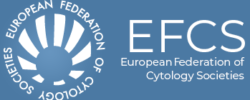Cytopathology 2011:22(1);68-69
Dear Editor,
We would like to draw the attention of your readers to the following letter to Dr Claude Cuvelier, President of the Union Européenne de Médecins Spécialistes (UEMS), dated 30 June 2010, which has so far not been acknowledged or answered.
We therefore now advise cytopathologists to find out who are their representatives on UEMS and make sure they are informed about what is required for cytopathology training and accreditation in order to ensure competence for independent practice. Preferably this should be done in time for the next UEMS meeting in May 2011. We will also refer the UEMS to the recommendations in a recent article in your journal.
The European Federation of Cytology Societies (EFCS) currently represents 25 national cytology societies covering nearly all of Europe.
This European, international organization highly appreciates the efforts of UEMS to standardize pathology training comprising histology, cytology, autopsy and molecular pathology.
We find it extremely important that the training charter of the UEMS clearly states that basic training in gynaecological and nongynaecological cytology is an integral part of the common trunk of pathology training.
Furthermore, the declaration of cytology as a new subspeciality – in the same sense that neuropathology, dermatopathology or forensic pathology already are – will open new opportunities in harmonization of cytopathology practice all over Europe.
We have to keep in mind at the same time, that even accepting that “the sovereignty of the member states cannot be overruled” a common European cytology subspecialty training followed by a European certificate will lessen the differences that right now do exist among many European countries in cytopathology training and practice. In our opinion, the only acceptable European organization to help these efforts at a high professional level is the EFCS.
Thus we are ready to be mandated by the UEMS in developing criteria for training in cytology as a subspecialty of pathology in Europe.
This is in accordance with our previous negotiations in Porto (Portugal): the final practical results of this work will be presented to UEMS within 1 year.
We are convinced that this joint effort and its expected result will be an important part of the professional integration process under the umbrella of the UEMS.
Looking forward to hearing from you soon.
With our warm regards,
Fernando Schmitt (EFCS President),
Martin Totsch (EFCS Treasurer),
Philippe Vielh (EFCS Secretary General).’
We also hope this letter reflects the wishes of your readers and would be pleased to hear their opinions in the correspondence column of your journal, or through our website https://www.efcs.eu

